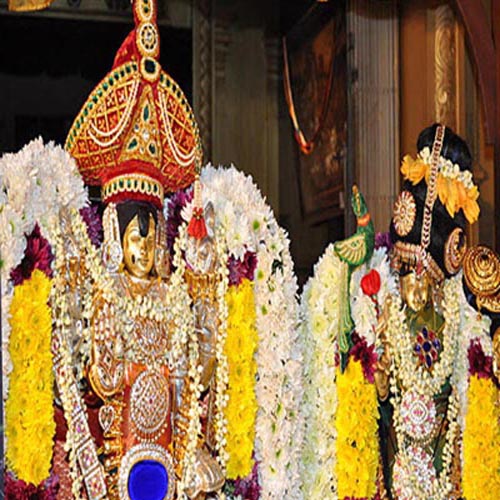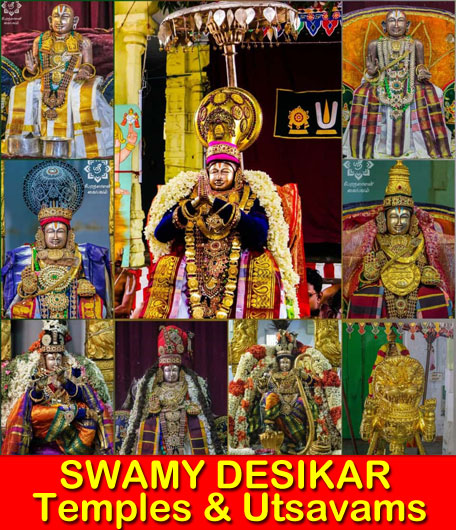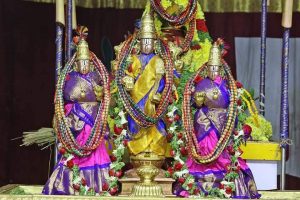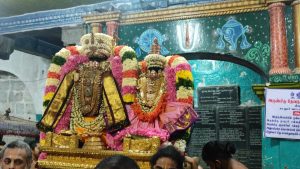Kothai, also known as Aandaal, is one of the 12 vaishnava apostles who propagated vaishnavism during the bhakthi era.
She is known to be an avatar of Sri Lakshmi. The purpose of this was to inspire people to understand and adopt ways of right living and worthy values.
She was found under a tulsi plant by Sri Periyazhvar, who is another of the 12 vaishnavite apostles. He adopts her, brings up as his own daughter and duly gets her wedded to the Lord Sri Ranganatha as she so desired.
She was found under the plant on the day of the star pooram or purvasha on the 4th month of the Tamil calendar called aadi.
Thus, Aadi Pooram is celebrated as Sri Aandaal’s Avatara day. This year, in 2021, Aadi Pooram falls on the 11th of August.
She has produced two monumental works. One, with 143 stanzas sung in the shringara ras depicting her love to Shriman Narayan in the form of Sriranganathan and her longing for him as she seeks reunion with him. This is called Nachiyar thirumozhi.
The other known as Thiruppavai has 30 stanzas in the bhakti ras.
Thiruppavai
As explained by elders….
Each verse (verse) in Thirupavai has a central prayer / theme which makes it unique and universal. The descriptions and allusions may have agrarian overtones and refer to the Hindu pantheon/ mythology.
We have been asked to focus on the core prayer while chanting and meditate on the same; even as we enjoy and appreciate the beauty and the poetry,
These verses have been severally interpreted in depth. I am too much of a novice and hold no claim to in-depth varied interpretations. Hereunder, I try to share my little understanding of those core thoughts. Please excuse any errors/insufficiencies that may have crept in.
Verse 1.
Naraayanane namake parai tharuvaan.
Meaning
The supreme Lord Sriman Narayana himself will grant us our prayer/ moksham.
Verse 2
Uyurmaar enru enni kulurndelor embaavaai
Meaning
Feel happy that we shall live with our prayers to the Lord.
Verse 3
Neengaatha Selvamniraidelor embhaavaai
Meaning
May we blessed with un-depleting abundant wealth.
Here wealth is perhaps not exactly the right word. It refers to a comprehensive abundance.
This verse also talks of the pervasive presence of the Lord extending and covering all of earth space – and more. To this overwhelming presence this prayer is sent. A prayer for un-depleting abundance; as the plea for abundant crops and milk would indicate.
Verse 4
VAzha ulaginil peidhidAi
Meaning
(Shower) rain(s) such as to enable life and living.
Rain such as to enable life; not torrential rains or floods, or yet Rainless draughts
Rain – the source of water – is central to life on earth.
This verse is prescribed and has been recited continually by congregations of devotees both during drought as well as during floods to pray for relief
Verse 5
ThooyuOmAi vandhu thoomalar yhoovi thozhudhu
VayinAl pAdi manathinAl sindhika
Poya pizhayum, ninranavum theeyinil ThoosAgum embAvAi
Meaning
When in prayer, Cleansed, with thought word and deed in sync, all sins past, present, and future are burnt.
We have been told: cleansing of the body and mind is important. Often while chanting, our minds waver and other thoughts keep occupying our minds. This is undesirable. Expressed prayer is seen as superior to silent prayer when there is total focus and sync.
Verse 6 to 15 Thirpavai –
The first 5 verses are introductory prayers. The next 10; six to 15 have both a central theme and a verse specific theme too.
Central theme.
Wake up and join in as we go together to seek the blessings of the Lord.
The wake-up calls are both actual in terms of physically waking up and a spiritual awakening.
A lot of importance is given in our ethos to the early bird. We are expected to rise at least with the sun if not before he rises. Some Verses refer to the pre-sun rise hour. The pre-sun rise hour (1 and a half hour between 4.30 to 6.00 a.m.) is called Brahma Muhurtham – universally auspicious.
The early morning winter chill of the month, naturally pulls one to the coziness of the bed. To overcome it, we are to wake up early to join in the bhajans as groups move on to the temple with prayer in their hearts and the Thirupavai song on their lips.
Kothai goes from house to house asking each friend to wake up, open the doors of her house (and heart) and join her in the procession.
Verse 6
………….
Ullaththuk kondu munivargalum yogigalum
Mella ezhundhu ari enra paeraravam
Ullam pugundhu kulirndhaelor embaavaay
Meaning
As the sages, thinking of the Lord chant his name, the sound slowly rises to a loud noise that fills the heart to sooth / cool it.
‘Nama stotram’ or singing the name of the Lord and listening to it has a great importance in our ethos. As one listens, the vibes fill the heart and draws one to the thoughts about and prayers to the Lord. The chanting and singing aloud the Thirupavai – and that in a group – is the tradition.
Verse 7
Kesavanai padavum nee kete kidandhayo
Meaning
While we sing the praises of the Lord, would you lie lazing?
The verse talks of the early morning chirps of the birds and the household noises of elders who have begun their Verse and goes on to urge this girl to get up and join in.
Often our desire for creature comforts pushes us into the comfort zone and sheer laziness keeps us there. A little nudge from a caring friend suffices to shake us up and have us up and about in the desired direction – physically and in spiritual pursuits too.
And so
While we sing the praises of the Lord, would you lie lazing?
Verse 8
DevAdhidevanai sendru naam sevithAl
Aa Aa yenru Aaraaindhu arllelOr embhaavaai
Meaning
When we go and surrender to the Lord
With delight we receive his grace
Sendru means to go. It implies that we need to go/ seek the Lord. It could also imply the element of voluntarily going.
There are several interpretations for the phrase ‘Aa Aa’ . I give 3 below.
some interpret that He blesses us delighted with our surrender.
Some interpret the delight as the delight of the devotee
Some interpret the Aa Aa as not an expression of delight, but as the groan of the pain of life and living of the one who Surrenders
Personally I tend to lean towards the second, the delight being that of the devotee.
So
We surrender to the Lord. With delight we receive his grace.
Verse 9
Maameer avalai ezhpeero
Un magalthaan Oomaiyo anri sevido, ananthalo
emapperunthuyil mandhirapataalo
Mamayan Madhavan, Vaikunthan enru enru nammum Palvin navinrelor embhaavaai
Meaning
Aunty, please wake your daughter up and ask her to join this satsang of seekers.
While repeatedly the Lord is being praised variously, if one still ignores (and sleeps), then she must be deaf, dumb, sunk in the lazy comfort zone or jinxed to a numbing slumber….
There are 2 aspects to this.
A. Early to bed and early to rise is a value with us. The habit of starting the day early is a habit that the mother (elders) are expected to develop in their wards. They are held responsible for waking the youngsters at an early hour. This habit is on the decline and that is not a healthy sign.
B. In our ethos, the mother (elders) has the responsibility to guide, nudge, motivate their wards to take on spiritual search seriously. They are charged with the responsibility of spiritually “waking” their wards up.
2. It is but natural to seek the divine. But if one does not (and many don’t) we need to look at the why. In this verse 3 reasons are given
a. Turning a deaf ear to the calls of the satsang
b. Given to a laziness getting immersed in the comfort zone often caused this. Religious practices and rituals are structural prods to help get out of this state – to move from the tamo Guna to the sat guna.
c. Having a curse/being jinxed.
However, the third is seen as more a matter of a humorous expression.
The first and second is a matter of using one’s Agnya, will power. The first happens out of ignorance and/or adamance, while the second stems from listlessness. These must be gotten rid of if one wants to move in the spiritual path.
So
May the young mothers wake their children up and
Let us wake up to the clarion call of the satsang to join them as they go seeking the Lord.
Verse 10
Notru swargam puriginra ammanai
……………..
……………..
Atral ananthal udaiyai arunkalame
Tetramaai vandhu thiravelor embhaavaai
Meaning
You who through your austerities is enjoying the comforts of paradise, you who are competent now have slipped into lazy slumber. you the rare vessel that contains HIS grace, please wake up, steady yourself and open your doors for us.
Several thoughts have been explored in these lines.
1. Austerities / prayerful practices of the past yield comforts in the present. (Here is such a girl.)
2.Seekers (such as the girls led by Kothai approaching this gopi’s house) need to entice the more endowed blessed ones to join them to enhance the satsang
3. Even a blessed soul may slip into lazy practices thus losing the benefit of the hard earned grace and would need to be nudged and shaken up to get going.
So Let us humbly seek the association of the more blessed to enhance our satsang and let us not lose the grace earned through laziness.
Verse 11
Sutrathu thozimaar ellam nin mutram pugundu mugil vannan per paada
Nee etrukkurangum porulleor embhaavaai
Meaning
Why are you still sleeping even as all your friends stand at your front yard singing the praises of the Lord?
Two thoughts are embedded.
1. Just because one resists, the satsang shall not leave them behind but patiently wait, prod and nudge till she (he) overcomes the resistance and moves along with the satsang.
This is an important duty of a seeker, not to move on but to take others along.
2. Why should/ would one be in the comfort of blissful laziness when a much greater bliss of joy awaits with just that little effort to shake of resistance.
So Let us shake off our resistance and move on with the satsang towards reaching salvation.
Verse 12:
Manathirku iniaanai paadanee vaai thiravai
Won’t you open your mouth to sing the glory of the one you hold dear to you.
Once again the superiority of the verbal prayer (as song) is reiterated. You may remember this refrain was expressed in verse 5 earlier.
Verse 13
KaLam thavirthu kalandelOr embhaavaai
Meaning:
Avoid being devious and join the satsang
It implies:
1. Avoid slumber to snatch away the precious moments in time to be spent in the divine bliss of sat sang.
2. Do not selfishly reminiscent your Krishnaanubhuvam (experiencing Krishna) secretly, lounging in bed. Get up. Join the sat sang. Share your experiences.
Verse 14
EngaLai munnan ezhupuvAn vAi pesum nangAi ezhundhirAi nAnAdAi nAvudaiyai
pangaia kannanai paadelOr embhaavaai
Meaning:
You who wake up first and wake us up with your clever and sweet words, today we have come to wake you up. Wake up and join us as we proceed seeking the Lord.
This highlights team spirit. Sometimes one who leads just gives up or slows down for whatever the reason. Then it is the duty of the rest of the team to inspire and motivate and take that person along. Sometimes we tend to shrug our shoulders and let go. This shall not be. Her (His) leadership is to be highlighted and inspired to shake off the sluggishness and take the lead once again.
Followership with all humility is a divine trait in itself.
Verse 15
This is considered central to thirupaavai.
There are 3 thoughts embedded – each to be reflected upon and internalized
1. ValeergaL neengaLe; nAnEdhAn Ayiduga
“You are the one to be blamed.”
“So be it.”
You are the tough one (one to be blamed) says a thozhi or teammate to which Kothai replies “So be it. But now come along, the point is not who is wrong or is to be blamed but to keep going – and going together. Blame fixing or finger pointing takes us nowhere. And when someone tries to hook you into the blame game one should be alert, sensitive and not fall into the trap.
2. ellOrum pOndAro? PondAr. POi eNNikkoL.
Has every one come? Yes. Come, count for yourself.
Seeing is believing. Experiential knowing is superior to hearsay. But one needs to get up and take the effort to confirm what is told.
3. VallAnai kondrAnai; MatrAnin mAtrazhikka vallAnai, MAyanai pAdelOr embhaavaai.
Let us sing the praises of the one who destroys the evil and (only) the differences among the differing.
What is different is not what is wrong. While evil had to be gotten rid of, differences must be resolved (not merely tolerated) and a common denominator arrived at. The one differing need to be seen as one who is to be taken along, not destroyed. What needs to be destroyed is the differences.
Verses 16 and 17
Core thoughts
These appear simple but have deep meanings which I am too small a person to delve into. I hope to be indulged in when I humbly try to share some thoughts herein.
In this section, the devotees are seeking entry into the abode of the Lord. Often we intend to and take all pains to reach our destination, but for some reason do not go all the way. And then the efforts of coming thus far goes a waste. Kothai and friends are keen not to get into this roadblock. They go all the way and get what they set out to.
– Ms. Padmini Janardhanan








